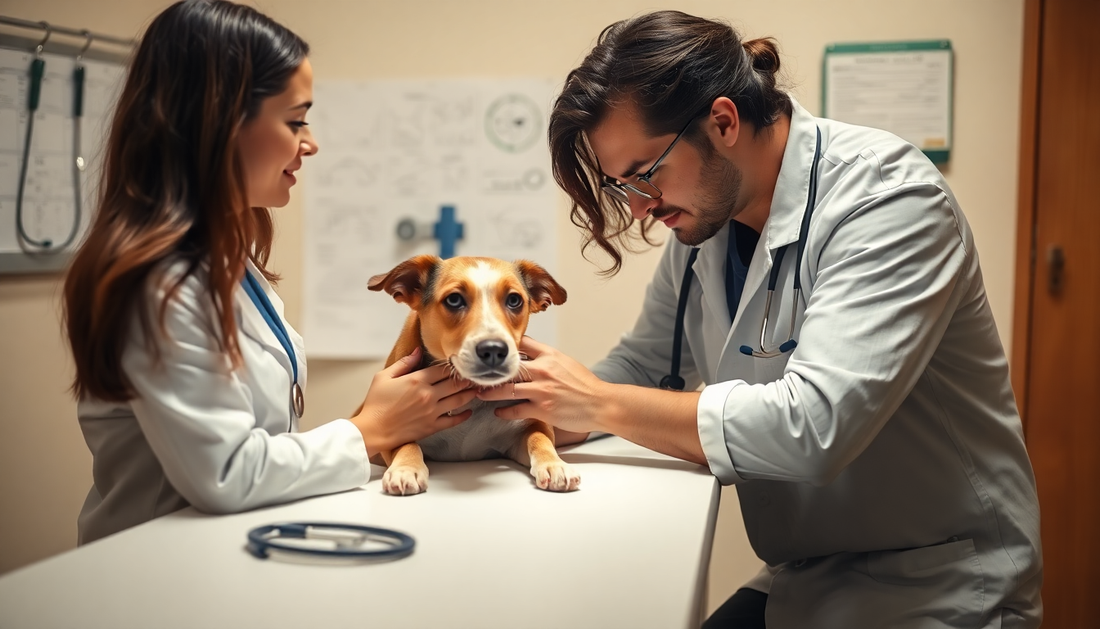
Common Signs Your Pet Needs a Vet Visit
Share
As pet owners, we want nothing more than to keep our furry friends happy and healthy. However, it's not always easy to recognize when our beloved companions may be in need of medical attention. Knowing the common signs that indicate your pet requires a vet visit can help you provide the best possible care and catch any issues early on.
In this blog post, we'll explore the various physical, behavioral, and health-related indicators that your pet may need to see a veterinarian. By understanding these warning signs, you can be a proactive and vigilant pet parent, ensuring your Furry Buddy Club member receives the care they deserve.
Physical Health Warning Signs
One of the most obvious signs that your pet may need a vet visit is a change in their physical appearance or behavior. Keep a close eye on the following physical indicators:
Changes in Appetite
A sudden decrease or increase in appetite can be a sign of an underlying health problem. If your pet is eating significantly less or more than usual, it's important to have them evaluated by a veterinarian.
Unusual Weight Loss or Gain
Unexplained weight fluctuations, whether it's a significant loss or gain, can be a red flag. Sudden weight changes may indicate a hormonal imbalance, digestive issue, or other medical condition.
Visible Skin or Coat Problems
Changes in your pet's skin or coat, such as excessive shedding, bald patches, rashes, or dull appearance, can signify a variety of skin conditions that require professional attention.
Mobility and Movement Difficulties
If your pet seems to be having trouble walking, jumping, or moving around, it could be a sign of joint pain, arthritis, or other musculoskeletal problems. Don't ignore any changes in their mobility or gait.
Behavioral Red Flags
Pets can't always verbalize when they're feeling unwell, but their behavior can often provide clues. Keep an eye out for the following behavioral changes:
Sudden Behavior Changes
If your typically friendly, outgoing pet suddenly becomes withdrawn, aggressive, or exhibits other uncharacteristic behaviors, it may be a sign of an underlying medical issue.
Lethargy or Decreased Activity
Excessive sleeping, reluctance to play, or a general lack of energy can indicate that your pet is not feeling their best. Lethargy can be a symptom of a wide range of health problems.
Unusual Aggression or Withdrawal
Sudden aggression or a tendency to hide and avoid interaction may be a sign of pain, fear, or discomfort. These behavioral changes should be addressed promptly.
Changes in Sleeping Patterns
Disruptions to your pet's normal sleep-wake cycle, such as excessive sleeping or restlessness, can be a sign of illness or discomfort.
Digestive and Elimination Concerns
The digestive system and elimination processes can also provide valuable insights into your pet's health. Be on the lookout for the following issues:
Vomiting or Diarrhea
Persistent vomiting or diarrhea can indicate a gastrointestinal problem, such as an infection, food intolerance, or even a more serious condition. Don't ignore these symptoms.
Blood in Stool or Urine
The presence of blood in your pet's stool or urine is a clear sign that something is amiss and requires immediate veterinary attention.
Straining During Bathroom Visits
If your pet appears to be in discomfort or having difficulty during bowel movements or urination, it could be a sign of a urinary tract infection, kidney issue, or other problem.
Consistent Constipation
Chronic constipation can be a symptom of a variety of health problems, from dietary issues to neurological disorders. Don't assume your pet is "just a little backed up."
Dental and Oral Health Indicators
Maintaining good oral health is crucial for your pet's overall well-being. Keep an eye out for these dental and oral health warning signs:
Bad Breath
Persistent bad breath, often described as a "rotten" or "fishy" odor, can be a sign of dental disease or other underlying health problems.
Swollen or Bleeding Gums
Inflamed, red, or bleeding gums can indicate the presence of gum disease, which can lead to tooth loss and other serious complications if left untreated.
Difficulty Eating
If your pet seems to be in pain or discomfort while eating, it could be a sign of dental problems, such as tooth decay or oral infections.
Excessive Drooling
Excessive drooling, beyond what's normal for your pet, can be a symptom of dental disease, oral pain, or other medical issues.
When to Seek Immediate Veterinary Care
While the signs we've discussed so far may indicate the need for a vet visit, there are certain situations that require immediate attention. If your pet is exhibiting any of the following severe symptoms, don't hesitate to contact your veterinarian or an emergency animal hospital right away:
- Severe vomiting or diarrhea
- Difficulty breathing
- Sudden collapse or loss of consciousness
- Severe pain or inability to move
- Ingestion of toxic substances
- Severe bleeding or trauma
In these cases, time is of the essence, and prompt medical care can make all the difference. It's also a good idea to have a well-stocked pet first-aid kit on hand to provide basic care until you can get your furry friend to the vet.
When you do visit the veterinarian, be prepared to provide detailed information about your pet's symptoms, behavior changes, and any other relevant details. This will help the vet make an accurate diagnosis and develop an appropriate treatment plan.
Conclusion
Recognizing the common signs that your pet needs a vet visit is crucial for maintaining their health and well-being. By staying vigilant and trusting your instincts, you can catch potential issues early and ensure your Furry Buddy Club member receives the care they need.
Remember, regular check-ups with your veterinarian are also essential for preventive care and early detection of any problems. Don't hesitate to reach out to your vet if you have any concerns about your pet's health or behavior. With proactive pet health management, you can help your furry friend live a long, happy, and healthy life.
